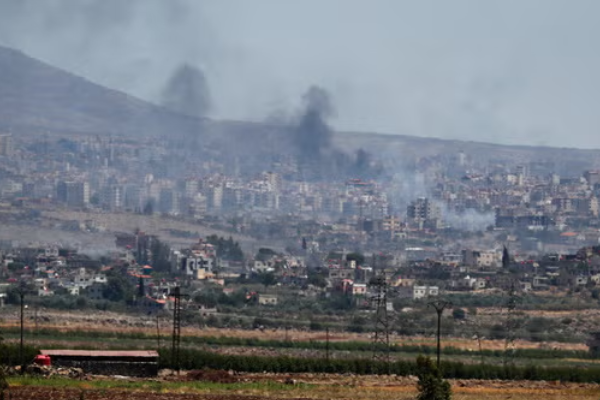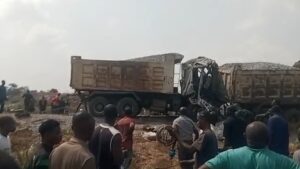Clashes erupted in the southern Syrian city of Sweida on Wednesday as a ceasefire between government forces and Druze armed groups failed, with Israel threatening to escalate its involvement, claiming to protect the Druze religious minority.
The Israeli army launched a strike near the Syrian Ministry of Defense’s entrance in Damascus, followed by a heavier strike several hours later.
Since the hostilities erupted, Israel has conducted a series of airstrikes on government convoys in southern Syria, as well as increased border forces.
Syria’s Defense Ministry had blamed militias in Sweida, a Druze-majority province, for breaking a ceasefire agreement signed on Tuesday, prompting Syrian army personnel to return fire.
The announcement stated that they were “adhering to rules of engagement to protect residents, prevent harm, and ensure the safe return of those who left the city back to their homes.”
Meanwhile, allegations of attacks on civilians persisted, and Druze with family members in the combat zone looked urgently for information about their fate despite communication breakdowns.
A rebel offensive led by Islamist insurgent groups ousted Syria’s longtime despotic leader, Bashar Assad, in December, bringing an end to a nearly 14-year civil war. Since then, the country’s new rulers have struggled to consolidate control.
The primarily Sunni Muslim leaders have faced suspicion from religious and ethnic minorities, whose fears increased after clashes between government forces and pro-Assad armed groups in March spiraled into sectarian revenge attacks. Hundreds of civilians from the Alawite religious minority, to which Assad belongs, were killed.
The Druze religious sect began as a 10th-century offshoot of Ismailism, a branch of Shiite Islam.
More than half of the roughly 1 million Druze worldwide live in Syria. Most of the other Druze live in Lebanon and Israel, including in the Golan Heights, which Israel captured from Syria in the 1967 Mideast War and annexed in 1981.
The latest escalation in Syria began with tit-for-tat kidnappings and attacks between local Sunni Bedouin tribes and Druze armed factions in the southern province.
Government forces that intervened to restore order then clashed with the Druze.
Read Also
- World leaders condemn Israel's decision to take control of Gaza City
- Israel signs largest export deal to supply Egypt with gas valued at $35bn
- U.S, Israel recall delegates from Gaza ceasefire talks, accuses Hamas of lacking 'good faith
- Israel allows Syrian troops limited access to Southern city of Sweida
No official casualty figures have been released since Monday, when the Syrian Interior Ministry said 30 people had been killed.
The U.K.-based war monitor Syrian Observatory for Human Rights said more than 250 people had been killed as of Wednesday morning, including four children, five women and 138 soldiers and security forces.
The observatory said at least 21 people were killed in “field executions.”
Interim President Ahmad al-Sharaa issued a statement Wednesday condemning the violations.
“These criminal and illegal actions cannot be accepted under any circumstances, and completely contradicts the principles that the Syrian state is built on,” the statement read, vowing that perpetrators, “whether from individuals or organizations outside of the law, will be held accountable legally, and we will never allow this to happen without punishment.”
Druze in the Golan gathered along the border fence to protest the violence against Druze in Syria.
In Israel, the Druze are seen as a loyal minority and often serve in the military.
In Syria, the Druze have been divided over how to deal with the country’s new leaders, with some advocating for integrating into the new system while others remained suspicious and pushed for an autonomous Druze region.
On Wednesday, Israeli Defense Minister Israel Katz said in a statement that the Israeli army “will continue to attack regime forces until they withdraw from the area — and will also soon raise the bar of responses against the regime if the message is not understood.”
Prime Minister Benjamin Netanyahu said in a statement Tuesday night that Israel has “a commitment to preserve the southwestern region of Syria as a demilitarized area on Israel’s border” and has “an obligation to safeguard the Druze locals.”
Israel has taken an aggressive stance toward Syria’s new leaders since Assad’s fall, saying it doesn’t want Islamist militants near its borders.
Israeli forces have seized a U.N.-patrolled buffer zone on Syrian territory along the border with the Golan Heights and launched hundreds of airstrikes on military sites in Syria.





